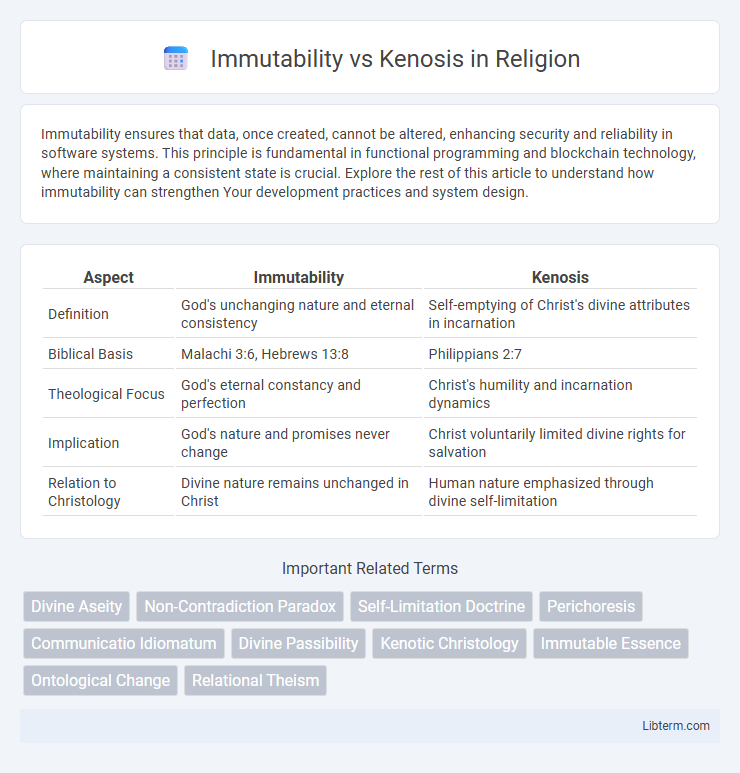Immutability ensures that data, once created, cannot be altered, enhancing security and reliability in software systems. This principle is fundamental in functional programming and blockchain technology, where maintaining a consistent state is crucial. Explore the rest of this article to understand how immutability can strengthen Your development practices and system design.
Table of Comparison
| Aspect | Immutability | Kenosis |
|---|---|---|
| Definition | God's unchanging nature and eternal consistency | Self-emptying of Christ's divine attributes in incarnation |
| Biblical Basis | Malachi 3:6, Hebrews 13:8 | Philippians 2:7 |
| Theological Focus | God's eternal constancy and perfection | Christ's humility and incarnation dynamics |
| Implication | God's nature and promises never change | Christ voluntarily limited divine rights for salvation |
| Relation to Christology | Divine nature remains unchanged in Christ | Human nature emphasized through divine self-limitation |
Understanding Immutability: A Foundational Concept
Immutability signifies an unchanging and consistent nature, fundamental in theology and philosophy to describe attributes of divinity or ultimate reality. Understanding immutability involves recognizing how this concept contrasts with kenosis, where divine self-emptying implies dynamic change or relinquishment. The tension between these ideas highlights essential debates about the nature of God's constancy versus relational responsiveness within spiritual doctrines.
Kenosis Explained: The Theology of Divine Self-Emptying
Kenosis, derived from the Greek term kenoo meaning "to empty," articulates the theological concept of divine self-emptying where God voluntarily relinquishes certain divine attributes to fully embrace human vulnerability. This doctrine emphasizes Jesus Christ's incarnation as a profound act of humility, embodying both deity and humanity without losing the essence of divinity, thus navigating the tension between immutability and mutable experience. The kenotic framework challenges traditional notions of God's immutability by presenting a dynamic understanding of divine love manifested through self-limitation and relational engagement with creation.
Historical Perspectives on Immutability and Kenosis
Historical perspectives on immutability emphasize God's unchanging nature as a cornerstone of classical theism, tracing back to early Church Fathers like Augustine and Aquinas who argued that divine perfection necessitates constancy. Kenosis, rooted in Philippians 2:7 and developed notably in 20th-century theology by thinkers like Jurgen Moltmann, highlights divine self-emptying as a dynamic act wherein God voluntarily limits certain attributes to engage authentically with creation. The tension between immutability and kenosis has shaped debates on divine nature, with historical theology balancing God's eternal constancy against scriptural portrayals of relational and responsive divinity.
Scriptural Basis for Immutability
The scriptural basis for the doctrine of immutability emphasizes God's unchanging nature as seen in Malachi 3:6, where God declares, "For I am the LORD, I do not change." James 1:17 reinforces this by stating, "Every good gift and every perfect gift is from above, coming down from the Father of lights, with whom there is no variation or shadow due to change." These verses underline the theological assertion that God's character, will, and promises remain constant, distinguishing immutability as an essential divine attribute in Christian doctrine.
Scriptural Insights on Kenosis
Kenosis, derived from Philippians 2:7, reveals Christ's self-emptying of divine privileges to fully embrace human limitations, showcasing unparalleled humility and obedience. Scriptural insights highlight this voluntary renunciation as essential for redemption, emphasizing the contrast with divine immutability, which denotes God's unchanging nature. The kenotic paradigm underscores God's dynamic engagement in the world, illustrating how Christ's incarnation fulfills divine love without compromising eternal immutability.
Philosophical Implications: Change and Constancy in Divinity
Immutability in divinity emphasizes the unchanging, eternal nature of the divine essence, asserting that God's attributes remain constant despite temporal changes. Kenosis, by contrast, introduces the concept of self-emptying or divine self-limitation, allowing for dynamic interaction with creation and the possibility of genuine change. The philosophical implications challenge the tension between divine constancy and relational responsiveness, raising critical questions about the nature of omnipotence, omniscience, and the possibility of temporal engagement without compromising divine perfection.
Immutability vs Kenosis: Points of Tension and Harmony
Immutability emphasizes God's unchanging nature, asserting that divine attributes remain constant across time and circumstances, while kenosis highlights the self-emptying aspect of God, particularly in the incarnation of Christ, suggesting a dynamic relational engagement with creation. Points of tension arise in reconciling divine constancy with the apparent vulnerability and change seen in kenotic theology. Harmony can be found by interpreting immutability as relationally consistent rather than static, allowing kenosis to express God's mutable interactions without compromising the essential, unalterable divine nature.
Impact on Christian Doctrine and Christology
Immutability emphasizes God's unchanging nature, underscoring divine perfection and constancy in Christian doctrine, while kenosis highlights Christ's self-emptying and voluntary limitation of divine attributes during the Incarnation. This contrast shapes Christological debates on how Jesus can be fully divine yet experience human limitations without compromising God's immutability. The interplay between immutability and kenosis influences theological understandings of the nature of Christ and the dynamics of divine-human interaction within the Trinity.
Modern Debates: Reconciling Immutability with Kenosis
Modern theological debates examine the tension between God's immutability, the doctrine that God is unchanging in essence and character, and kenosis, the concept of divine self-emptying as depicted in Philippians 2:7. Scholars explore models where immutability is understood as God's unchanging purpose or relational constancy rather than absolute stasis, allowing for dynamic interaction with creation while maintaining divine faithfulness. This reconciliation seeks to affirm God's eternal nature alongside the transformative experiences attributed to divine kenosis in incarnational theology.
Practical Applications and Spiritual Relevance
Immutability highlights the unchanging nature of divine attributes, offering a foundation for consistent moral principles and spiritual stability in religious practice. Kenosis, characterized by self-emptying and humility, encourages believers to emulate Christ's example through service and surrender in their daily lives. Together, these concepts balance divine constancy with relational intimacy, fostering both unwavering faith and transformative spiritual growth.
Immutability Infographic

 libterm.com
libterm.com